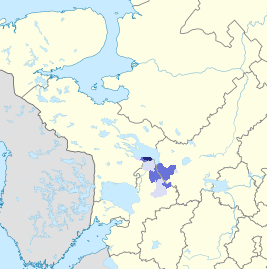Vepsians
Vepsians or Veps (Vepsian: vepsäläiset, vepslaine) are a Finno-Ugric ethnic group native to Russia, primarily living in the republic of Karelia, Leningrad Oblast, and the Vologda Oblast. They speak the Veps language, which belongs to the Finnic branch of the Uralic language family.
History[edit | edit source]
The history of the Vepsians dates back to the first millennium, with their culture and community life deeply rooted in the forested regions of what is now northwestern Russia. Historically, they have been known for their traditional livelihoods, which include fishing, hunting, and farming. Over the centuries, the Vepsians have experienced various cultural and political influences, notably from the Novgorod Republic, the Grand Duchy of Moscow, and later the Russian Empire.
During the Soviet era, the Vepsians, like many other small ethnic groups in the USSR, faced challenges related to cultural preservation and language decline. Policies aimed at centralization and Russification had a significant impact on the Vepsian language and cultural practices. However, the late 20th century saw a revival of interest in Vepsian heritage, with efforts to revitalize the language and promote Vepsian culture.
Language[edit | edit source]
The Veps language is classified as critically endangered by UNESCO. It has several dialects but has seen a decline in fluent speakers, particularly among the younger generation. Efforts to revive the language include educational programs, publications, and cultural events aimed at fostering a sense of identity among the Vepsians.
Culture[edit | edit source]
Vepsian culture is rich in folklore, traditional music, and crafts such as wood carving and textile weaving. Traditional Vepsian cuisine reflects the natural resources of their environment, with fish, game, and forest berries constituting the main ingredients.
Festivals and folk celebrations play a significant role in preserving Vepsian cultural traditions. One of the most notable events is the Vepsian Folk Culture Festival, which attracts participants from Vepsian communities and enthusiasts of Finno-Ugric cultures.
Demographics[edit | edit source]
The population of Vepsians has been declining, with census data indicating a decrease in those identifying as Vepsian in Russia. Factors contributing to this decline include assimilation, migration, and the aging population of rural Vepsian communities.
Challenges[edit | edit source]
The Vepsians face several challenges, including the preservation of their language and culture in the face of globalization and modernization. Environmental issues also pose a threat to their traditional ways of life, as does the limited recognition and support for minority groups in Russia.
Conclusion[edit | edit source]
The Vepsians are a testament to the resilience and richness of Finno-Ugric cultures. Despite the challenges they face, efforts to preserve and promote Vepsian language and culture continue, contributing to the diversity and cultural wealth of the region.
This article is a ethnic-group stub. You can help WikiMD by expanding it!
Transform your life with W8MD's budget GLP1 injections from $125 and up biweekly
W8MD offers a medical weight loss program NYC and a clinic to lose weight in Philadelphia. Our W8MD's physician supervised medical weight loss centers in NYC provides expert medical guidance, and offers telemedicine options for convenience.
Why choose W8MD?
- Comprehensive care with FDA-approved weight loss medications including:
- loss injections in NYC both generic and brand names:
- weight loss medications including Phentermine, Qsymia, Contrave, Diethylpropion etc.
- Accept most insurances for visits or discounted self pay cost.
- Generic weight loss injections starting from just $125.00 for the starting dose
- In person weight loss NYC and telemedicine medical weight loss options in New York city available
Book Your Appointment
Start your NYC weight loss journey today at our NYC medical weight loss, and Philadelphia and visit Philadelphia medical weight loss Call (718)946-5500 for NY and 215 676 2334 for PA
Search WikiMD
Ad.Tired of being Overweight? Try W8MD's NYC physician weight loss.
Semaglutide (Ozempic / Wegovy and Tirzepatide (Mounjaro / Zepbound) available. Call 718 946 5500.
Advertise on WikiMD
|
WikiMD's Wellness Encyclopedia |
| Let Food Be Thy Medicine Medicine Thy Food - Hippocrates |
Translate this page: - East Asian
中文,
日本,
한국어,
South Asian
हिन्दी,
தமிழ்,
తెలుగు,
Urdu,
ಕನ್ನಡ,
Southeast Asian
Indonesian,
Vietnamese,
Thai,
မြန်မာဘာသာ,
বাংলা
European
español,
Deutsch,
français,
Greek,
português do Brasil,
polski,
română,
русский,
Nederlands,
norsk,
svenska,
suomi,
Italian
Middle Eastern & African
عربى,
Turkish,
Persian,
Hebrew,
Afrikaans,
isiZulu,
Kiswahili,
Other
Bulgarian,
Hungarian,
Czech,
Swedish,
മലയാളം,
मराठी,
ਪੰਜਾਬੀ,
ગુજરાતી,
Portuguese,
Ukrainian
Medical Disclaimer: WikiMD is not a substitute for professional medical advice. The information on WikiMD is provided as an information resource only, may be incorrect, outdated or misleading, and is not to be used or relied on for any diagnostic or treatment purposes. Please consult your health care provider before making any healthcare decisions or for guidance about a specific medical condition. WikiMD expressly disclaims responsibility, and shall have no liability, for any damages, loss, injury, or liability whatsoever suffered as a result of your reliance on the information contained in this site. By visiting this site you agree to the foregoing terms and conditions, which may from time to time be changed or supplemented by WikiMD. If you do not agree to the foregoing terms and conditions, you should not enter or use this site. See full disclaimer.
Credits:Most images are courtesy of Wikimedia commons, and templates, categories Wikipedia, licensed under CC BY SA or similar.
Contributors: Prab R. Tumpati, MD






